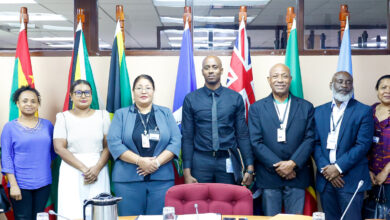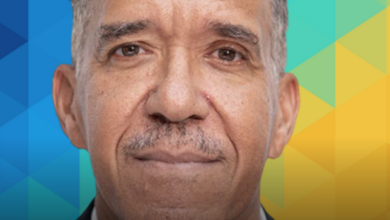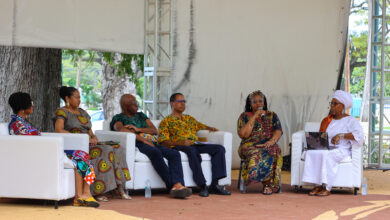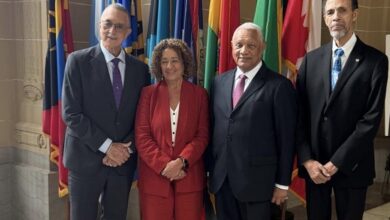Mr. Chairman, I recognise very specially the Prime Minister of the Bahamas , the Honourable Hubert Ingraham, who was recently re-elected to his Office after a voluntary five-year respite from his Prime Ministerial perch. He had welcomed me to the Bahamas at my first Heads of Government Conference in July 2001. I now reciprocate. Prime Minister Ingraham is a veteran of CARICOM; his wisdom and experience will no doubt assist us in charting the most efficacious way forward.
At the same time I thank most sincerely the weighty contributions of his immediate predecessor, the Honourable Perry Christie, to the regional integration movement.
I also acknowledge, especially too, the presence at the Heads of Government Conference for the first time, the Honourable Stephenson King, the Acting Prime Minister of St. Lucia, who is here due to the absence of Sir John Compton who is still recuperating from his unfortunate illness. Sir John is always in our prayers and we wish him a speedy and full recovery to good health. Meanwhile, I affirm that we in the Caribbean Community are at one with the people of St. Lucia at this time of temporary difficulty or challenge.
Over the past six months, under my Chairmanship, the Caribbean Community (CARICOM) has made more than satisfactory progress in its consolidation and further advancement. Indeed, some historic initiatives and monumental achievements have been recorded. There has thus been and admixture of routine, institutionalised work, necessary and desirable but unglamorous, and path-breaking ventures. However, as always, in life and production, there is much more to be done, and urgently. That is our mission, it is our central task.
I am enjoined by custom, necessity, and best practices in regional governance to provide at this gathering a summary of my stewardship and to point the way forward.
Several vital bundles of issues have been addressed and major outcomes were recorded over the past six months including:
1. The historic hosting of Cricket World Cup 2007 in the Caribbean ;
2. The commercial alliance between LIAT and Caribbean Star and the deepening of a nexus between them amidst the problematic fashioning of a regional air and marine transport policy.
3. The holding of an unprecedented Conference on the Caribbean in Washington between June 19th and 21st with State-to-State encounters, people-to-people dialogues, and diaspora and experts’ engagements; and
4. The convening of critical meetings, on a range of important regional agenda items, within the context of the Revised Treaty of Chaguaramas, including the hugely successful 18th Inter-Sessional Meeting of the Conference of Heads of Government of CARICOM held in St. Vincent and the Grenadines between February 12th and 14th 2007.
At the Inter-Sessional Meeting in St. Vincent and the Grenadines, real progress was made on the further practical elaboration of the CSME and on related matters. Central among all these was the receipt by the Heads of Government and the endorsement of, a Report entitled Towards a Single Economy and a Single Development Vision presented by Professor Norman Girvan and his team. A host of accompanying decisions were accordingly taken, including: the process for the further refinement for the Development Vision; the formulation of a Regional Strategic Development Plan to operationalise the Framework and Vision with an enduring focus on poverty alleviation; the imperative of advancing the adoption of instruments such as the CARICOM Investment Code, the CARICOM Financial Services Agreement, investment incentives, capital market integration and monetary cooperation; and the determination that the Caribbean Business Council be an associate institution of the Caribbean Community under the Revised Treaty.
In St. Vincent and the Grenadines it was also further agreed that the timetable, and elements thereof, for the full implementation of the CSME should be as follows:
(i) Phase I (mid-2005 to mid-2008) for the Consolidation of the Single Market and Initiation of the Single Economy; and
(ii) Phase II (2009 to 2015) for the Consolidation and Completion of the Single Economy Process.
In this current Phase I there is on-going work required for the consolidation of the Single Market and the initiation of particular steps in the Single Economy process. Outstanding work in this on-going enterprise include the bringing into effect of the Caribbean Community Skilled Nationals Act in one member-state; the establishment of the Competition Commission; the operationalisation of the CARICOM Development Fund; the possible setting up of a Regional Development Agency; the enlargement of the categories of employees in pursuance of the objective of a freedom of movement of labour; and the conclusion of the deliberations on the reformation of regional governance structures and the implementation of the relevant reforms based on the seminal work of the advisory group on governance headed by Professor Vaughn Lewis , and suggestions or proposals by the Government of Guyana in this regard.
At the Inter-Sessional Meeting in St. Vincent and the Grenadines, it was decided also to add “Security” as the fourth pillar of regional integration movement, thereby bolstering the pre-existing tripod of economic integration, the coordination of foreign policy, and functional cooperation. This addition of the security dimension recognises the multi-dimension nature of the security challenges in the Region, including crime, and its fundamental significance to the economic development, socio-political stability, and civilised life and living in the member-states of CARICOM.
Several other important organs of institutions of CARICOM were engaged in meaningful work over the past six months including entities concerned with international and regional trade, education and training, agriculture, finance and planning, foreign relations, health and HIV/AIDS, crime and security, air and marine transportation, and cricket.
Ah yes, cricket. This mass sport which has brought our Region so much admirable recognition, historically, and at which we were dominant, internationally, for over fifteen years from 1979 onwards, has in recent times been occassioning a measure of ridicule upon us. We, as Heads of Government, in conjunction with all the relevant stakeholders must act positively to arrest this sad decline in our cricketing fortunes. And we must make a fresh start, off the field of play, at this Conference.
The agenda for this 28th Meeting of the Conference of Heads of Government is replete with matters of great moment for our Community. They include:
(i) The broadening and deepening of functional cooperation in such a manner as to connect intimately and directly the lives of the people of our Caribbean ;
(ii) The further elaboration of issues touching and concerning human resource development and health, including the preparations for the regional summit on non-communicable diseases;
(iii) A more perfecting of the CSME;
(iv) Developments related to agriculture, including the outcome of the donors’ conference which was held last month in Trinidad ;
(v) Crime and Security;
(vi) Issues related to the conduct of external trade negotiations;
(vii) Air and maritime transportation;
(viii) Governance of the Caribbean Community; and
(ix) The practical follow-up to the Conference on the Caribbean held in the Washington .
All of us gathered here are resolved to advance practical solutions to certain specific and vital challenges so as to advance further our region’s strategic interests. We ought to speak frankly, though respectfully as usual, at both our plenary sessions and in our caucuses on these questions. There are a few matters on which I believe that our region’s peoples expect satisfactory answers and effective resolution.
First, the issue of the increased cost of air travel and the fashioning of a sound air transport policy. It is very easy for this or that leader or unscripted Minster to play demagogue on this matter, but the unvarnished facts must be faced squarely. It is well-known that the increased cost of air travel is a consequence of a moderate rise in air fares to accommodate market realities, and a more substantial hike in taxes and “add-ons”. All regional governments are obliged to address these concerns jointly and arrive at common solutions.
It is in my view an act of irresponsibility for any government to stand askance from regional solutions to the practical issues of intra-regional air travel. Moreover, it is entirely contrary to the letter and spirit of the regional integration movement for some governments to act subversively of the enterprise known as LIAT. Surely, it must be an over-riding obligation of CARICOM member-states, served by LIAT, to put equity in this regional air carrier or provide it with adequate market support. It is not unknown for market support to be provided by some CARICOM member-states to international carriers. Why then no such support for LIAT which has been serving our region faithfully and well? It cannot be right or reasonable to expect the tax-payers of Antigua and Barbuda , Barbados , and St. Vincent and the Grenadines to continue to subsidise the regional air travel of other member-states. These three countries cannot reasonably be expected to carry the burden forever. To be sure, LIAT has to implement out further internal reforms to enhance its efficiency but it would help immensely if all regional hands are aboard LIAT.
I remind my colleagues that in 1973, the titans of the regional integration movement made two momentous decisions: First, they concluded the Treaty of Chaguaramas which established CARICOM; and secondly, they agreed to support LIAT as a regional entity. Even countries not served by LIAT, such as Michael Manley’s Jamaica , bought shares in this airline. Are we less resolute than our forbears? Can we afford to throw away 50 years of LIAT? What, if any, is the alternative, credibly? Are we prepared to ignore the lessons of the past, tilt at eagled wind-mills, and be in quest of mirages? Are the failed airline ghosts of the past to rule us from their graves? Do we not have the confidence in our ability, as the children of an authentic Caribbean civilisation, to fashion a regional airline solution in our peoples interests? You know my answers and those of the government of St. Vincent and the Grenadines . The regional governments’ approach to LIAT will at this Conference be a test of their seriousness!
Secondly, if this regional integration movement is to survive and thrive, it must address practically the day-to-day concerns of the people of the region and it must benefit all the member-countries in a way which is not unduly beneficial to some and not to others. The Founding Fathers of CARICOM and the Revised Treaty of Chaguaramas have put provisions and mechanisms in place to ensure that the member-states must not be unequally yoked in perpetuity and without compensatory balances. But measures to assist disadvantaged countries, sectors and regions must not be formalistically crafted or implemented in a manner which is a sham.
Thus, for example, as all our economies become transformed increasing from goods-based to services-oriented ones, functioning international airports are an absolute necessity. Both Dominica and St. Vincent and the Grenadines do not have international airports. A regional integration movement which sheds itself of any responsibility to partner with the governments of Dominica and St. Vincent and the Grenadines to build their international airports, would be diminished accordingly. CARICOM must therefore be engaged always on central strategic matters, not simply peripheral ones.
Thirdly, the consensus which is emerging in our Region on the way forward must be suitably proclaimed. It is evident to all that there is a quest to build a modern, competitive post-colonial economy which is at once national and regional. This home-grown consensus on the most appropriate way forward is lodged within the wider context of the further and many-sided ennoblement of our Caribbean civilisation and its national components. We in our Region have come of age. And we must act maturely in the interest of our own humanisation. Our praxis must thus show that although we are not better than anyone else, no one is better than us. This reflects our essential and existential humanity and dignity!
And fourthly, immediately upon us are vital external trade and economic partnership agreements in the offing. These beckon with the European Union, the USA , Canada, and other countries in our hemisphere. We must be at once bold and careful in these exercises to achieve our objectives. A similar approach no doubt drives us in the WTO negotiations. Our livelihoods and sensible positioning in the international political economy, depend, in part, on our successful efforts on these issues.
Mr. Chairman , Barbados where we meet is a beacon of liberty, democracy, and progress. Its people are mature, reflective, good-natured and well-grounded in social democratic and Christian values. They have been fortunate to have had a succession of distinguished leaders. The names of Sir Grantley Adams and Errol Walton Barrow spring to mind. Owen Seymour Arthur who has been at his country’s helm through three successive general elections is in that esteemed tradition. I am most pleased to pass the baton of CARICOM’s Chairmanship to him. I am sure that he would do an outstanding job.
Prime Minister Arthur and I had earlier decided during each other’s Chairmanship to work in close tandem with each other. He and I speak weekly on the telephone on regional matters as well as on mutual intellectual pursuits. I have been similarly engaged with other Heads of Government. Even when I was in Cuba for one month for medical attention and recuperation between mid-April to mid-May 2007, consequent on my injuries arising from a vehicular accident, I sought to do my job as CARICOM Chairman.
In this regard I was most ably assisted by our Secretary-General, Dr. Edwin Carrington, and his Secretariat staff. They have been magnificent; and I thank them most sincerely.
Similarly, during Cricket World Cup, the Deputy Prime Minister, the Honourable Mia Mottley, has been a tower of strength. I am deeply indebted to her and her team. Equally, Senior Minister Billie Miller has been exceptional in the build-up to the Conference on the Caribbean .
My dear friend, Prime Minister Patrick Manning of Trinidad and Tobago was with me every single week with his advice and support. He and his people are at the core of this integration movement. I thank them!
My colleague Heads in the OECS and I have toiled very closely together over the past six months in the regional integration vineyard. So, too, have my other colleagues in Guyana , Belize , Suriname , the Bahamas , Haiti , and Jamaica . Prime Minister Portia Simpson-Miller of Jamaica , the only woman among the Heads, has shown herself to be destiny’s child, the conscience of Region’s people, and the unquestioned champion of the poor and the working people. She has guided me safely on many-a-matter and teaches daily that we must prepare a place at the table for all, even in the presence of so-called “enemies”.
Finally, I thank the people of the Region for their support and love over the past six months as CARICOM’s Chairman. They inspire you to build in the tradition of the Prophet Nehemiah, uplift your spirit, and urge you to keep your focus despite the contrary efforts of the modern day Sanballats and Tobiahs of the Ammonities who are interested only in pulling down, not building up. The political virtue of individual and collective self-mastery is our sword of progress and our shield against negativism and backwardness. So armed, our Region is truly ready for serious business.
Thank you!





